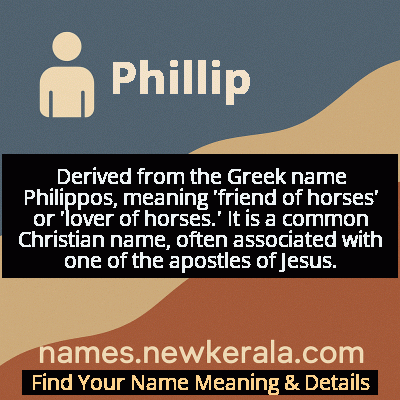Phillip Name Meaning & Details
Origin, Popularity, Numerology Analysis & Name Meaning of Phillip
Discover the origin, meaning, and cultural significance of the name PHILLIP. Delve into its historical roots and explore the lasting impact it has had on communities and traditions.
Name
Phillip
Gender
Male
Origin
Christian
Lucky Number
1
Meaning of the Name - Phillip
Derived from the Greek name Philippos, meaning 'friend of horses' or 'lover of horses.' It is a common Christian name, often associated with one of the apostles of Jesus.
Phillip - Complete Numerology Analysis
Your Numerology Number
Based on Pythagorean Numerology System
Ruling Planet
Sun
Positive Nature
Leaders, ambitious, highly driven, self-reliant, innovative.
Negative Traits
Overly aggressive, domineering, impatient, selfish.
Lucky Colours
Red, orange, gold.
Lucky Days
Sunday.
Lucky Stones
Ruby, garnet.
Harmony Numbers
2, 3, 9.
Best Suited Professions
Entrepreneurs, managers, engineers.
What People Like About You
Courage, determination, leadership.
Famous People Named Phillip
Prince Philip, Duke of Edinburgh
Royal Consort
Served as consort to Queen Elizabeth II for 73 years and founded The Duke of Edinburgh's Award
Philip II of Macedon
King
Transformed Macedonia into a dominant military power and prepared the foundation for Alexander the Great's empire
Philip Seymour Hoffman
Actor
Won Academy Award for Best Actor for his portrayal of Truman Capote and renowned for his character acting
Saint Philip the Apostle
Religious Figure
One of the original Twelve Apostles who introduced Nathanael to Jesus and evangelized in Phrygia
Name Variations & International Equivalents
Click on blue names to explore their detailed meanings. Gray names with will be available soon.
Cultural & Historical Significance
The Renaissance and Enlightenment periods saw the name maintain its prestige among European nobility and intellectuals. In the modern era, notable figures like Prince Philip, Duke of Edinburgh, have kept the name in the public consciousness, while scientific achievements like the discovery of the Philippine Islands by Ferdinand Magellan (named for Philip II of Spain) demonstrate the name's global impact. The name's consistent presence across 2,300 years of recorded history makes it one of the most enduring and culturally significant names in Western civilization, representing a bridge between ancient wisdom and contemporary values.
Extended Personality Analysis
Individuals named Phillip are often perceived as possessing a balanced combination of traditional values and intellectual curiosity. They typically exhibit strong leadership qualities, reliability, and methodical thinking—traits that align with the name's royal and apostolic heritage. Many Phillips demonstrate excellent problem-solving skills and strategic planning abilities, reminiscent of historical figures like Philip II of Macedon who excelled at military and political strategy. The name also suggests a person who values deep, meaningful relationships rather than superficial connections, reflecting the apostolic Philip's role as a bridge between different communities.
Contemporary psychological studies of name perception indicate that Phillips are often viewed as trustworthy, competent, and slightly conservative, with a natural authority that inspires confidence in others. Their analytical nature combined with emotional stability makes them effective in leadership positions across various fields. The 'horse lover' etymology subtly influences perceived characteristics, suggesting strength, grace under pressure, and the ability to guide powerful forces effectively. Many Phillips display a quiet confidence rather than overt ambition, preferring to achieve through careful planning and persistent effort rather than dramatic gestures. This combination of strategic thinking and relational depth creates individuals who excel as diplomats, executives, scientists, and community leaders.
Modern Usage & Popularity
In contemporary naming trends, Phillip maintains steady popularity as a classic, respectable choice that bridges traditional and modern sensibilities. According to Social Security Administration data, Phillip ranked #425 in the United States in 2022, demonstrating its enduring appeal despite competition from trendier names. The name enjoys particular popularity among families valuing historical significance and religious heritage, often chosen to honor family traditions or religious figures. Modern usage often favors the single 'L' spelling (Philip) over the double 'L' (Phillip), though both remain in common use with the double-L spelling comprising approximately 30% of occurrences. The name's versatility allows it to work well across socioeconomic and cultural boundaries, from professional settings to creative industries. Recent years have seen a slight decline in usage as parents gravitate toward more unique names, but Phillip continues to be chosen by those seeking a name with substantial historical weight and international recognition that won't sound dated as trends change.
Symbolic & Spiritual Meanings
Symbolically, Phillip represents the harmonious relationship between humanity and nature, specifically the bond between humans and horses—animals long associated with nobility, power, and freedom in numerous cultures. The name embodies the concept of 'taming wild forces' through wisdom and partnership rather than domination, suggesting an individual who can harness great energy and direct it productively. In Christian symbolism, Saint Philip's role as an evangelist to the Greeks positions the name as representing cultural bridge-building and the transmission of wisdom across civilizations. The horse imagery connects to broader symbolic meanings of journey, progress, and the ability to carry burdens gracefully while maintaining forward momentum.
In psychological and metaphorical terms, the name suggests a personality capable of balancing raw energy with disciplined control, much like a skilled rider guiding a powerful steed. This dual nature makes Phillip symbolically rich, representing both the wild spirit of freedom and the civilized application of power and intelligence. The name also carries connotations of loyalty and service, reflecting both the horse's historic role as humanity's companion in labor and travel, and the apostolic dedication to higher purposes. In modern symbolic interpretation, Phillip represents the integration of traditional strength with contemporary adaptability—a name that honors history while remaining relevant to current challenges and opportunities.

